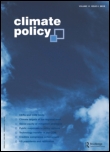
Sub- and non-state climate action: a framework to assess progress, implementation and impact
Hale, Thomas .N. / Sander Chan / Angel Hsu / Andrew Clapper / Cynthia Elliott / Pedro Faria / Takeshi Kuramochi / Shannon McDaniel / Milimer Morgado / Mark Roelfsema / Mayra Santaella / Neelam Singh / Ian Tout / Chris Weber / Amy Weinfurter / Oscar WiderbergExterne Publikationen (2020)
in: Climate Policy 21 (399), 406-420
DOI: https://doi.org/10.1080/14693062.2020.1828796
Information
The rising importance of cities, states and regions, firms, investors, and other subnational and non-state actors in global and national responses to climate change raises a critical question: to what extent does this climate action deliver results? This article introduces a conceptual framework that researchers and practitioners can use as a template to assess the progress, implementation, and impact of climate action by sub- and non-state actors. This framework is used to review existing studies that track progress, implementation, and achievement of such climate action between 2014 and mid-2019. While researchers have made important advances in assessing the scope and future potential of sub- and non-state climate action, we find knowledge gaps around ex-post achievement of results, indirect impacts, and climate action beyond the realm of greenhouse gas reductions.
Key policy insights
• While we increasingly understand the scale, scope, and potential of climate action by sub- and non-state actors, we lack rigorous evidence regarding the results achieved and their broader impacts.
• More information on progress and impact is essential for the credibility of sub- and non-state climate action. Policymakers need to understand which approaches are working and which are not, promoting the diffusion of best practice and creating conditions for stronger action in the future.
• The proposed conceptual framework can be tailored and applied to a wide range of initiatives that target mitigation, adaptation, and other spheres of climate action. By providing a template to identify key elements of progress tracking and evaluation, the framework can help align both research and practitioner communities around the data and metrics required to understand the overall impact of climate action.

